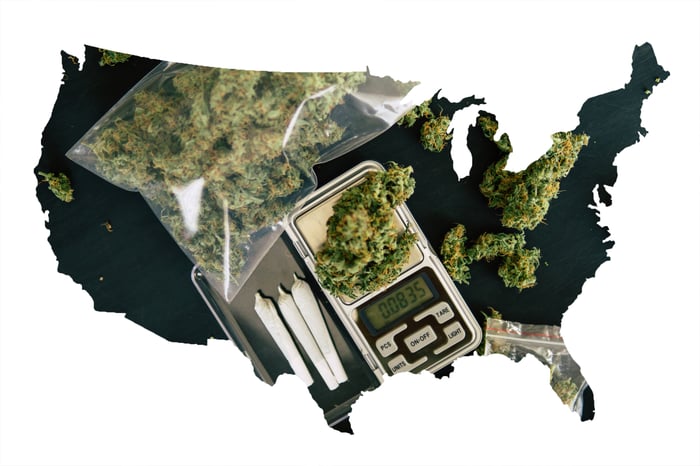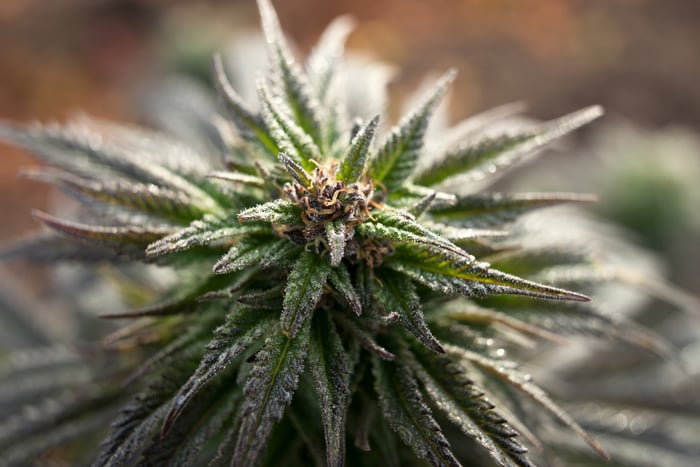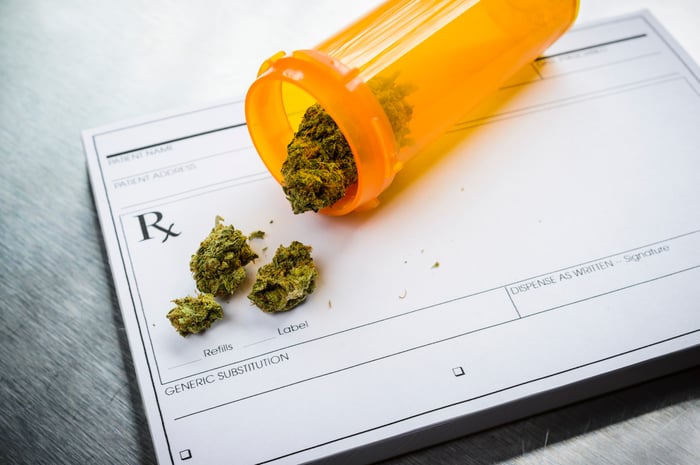This has been an unforgettably difficult year for many Americans. The coronavirus disease 2019 (COVID-19) has cost lives, jobs, and completely upended our normal societal habits. But amid this chaos is the reality that, in just 51 days, Americans across the country will head to their local voting booth or mail in their ballots to decide who'll lead this country for the next four years.
Keep in mind that it's not just the presidency or the make-up of Congress that'll be decided on November 3, 2020. Residents in six states will be heading to the polls to decide if marijuana will be legalized from an adult-use or medical standpoint.
We entered 2020 with two-thirds of all states having legalized medical pot, along with 11 states that have legalized the consumption and/or retail sale of recreational weed. By the time the November election is over, there could be as many as two new states to legalize medical marijuana and up to four new states that might wave the green flag on adult-use cannabis.
Here are the five states guaranteed to be voting on marijuana in November.

Image source: Getty Images.
New Jersey
All the way back in mid-December 2019, New Jersey became the first state to guarantee that there would be a marijuana initiative on its November ballot. Interestingly, New Jersey appeared to be very close to legalizing recreational cannabis at the legislative level during the first quarter of 2019. However, momentum for a legislative approval was derailed by a late push for certain social reforms.
Known as Public Question 1, Garden State voters will be asked to support or oppose the constitutional amendment that would legalize the possession, use, production, processing, and sale of cannabis to persons aged 21 and older. According to a poll from DKC Analytics that was released in late July, close to 68% of respondents either strongly or somewhat supported legalization.
Waving the green flag on recreational weed would be a positive for both Curaleaf (CURLF -0.40%), the largest multistate operator in the country, and TerrAscend (TRSSF -4.14%), which has chosen to focus on New Jersey as one of its three core markets. Though TerrAscend is predominantly focused on the medical marijuana side of the equation, adult-use legalization could lead to a larger patient pool. Both Curaleaf and TerrAscend should benefit as New Jersey aims for at least $1 billion in annual weed sales by 2024.

Image source: Getty Images.
Arizona
Other than New Jersey, the other adult-use cannabis measure that looks to have a good chance of passing is Arizona's Proposition 207.
Arizona's new measure allows persons aged 21 and over to possess and use cannabis, requires the states' Department of Health and Human Services to develop and enforce regulation for the industry, and adds on a 16% tax to the sale of marijuana, in addition to existing taxes.
For those who might remember, this is Arizona's second try to legalize recreational marijuana, with Proposition 205 falling short in Nov. 2016, with 48.7% "yes" votes. History has proved kind to states that attempt to pass an adult-use cannabis measure a second time, with California and Oregon both succeeding after initial failures. A survey from OH Predictive Insights that was released in early July found that supporters outnumbered the opposition by nearly two-to-one (62% yes to 32% no).
A legalization of recreational weed in Arizona would be a nice victory for Harvest Health & Recreation (HRVSF), which has not had the easiest year. Harvest Health has abandoned some of its aggressive expansion plans to conserve capital. The company does, however, have the largest presence of any multistate operator in the Grand Canyon State.

Image source: Getty Images.
Montana
Entering the year, Montana was certainly not on my short list of states that I expected to be voting on a recreational pot initiative in 2020 -- but here we are.
Montanans will actually be approached with two cannabis question on their November ballot, albeit they're both working toward the same goal. Montana CI-118 is an initiated constitutional amendment that, if passed, would allow the legislature to establish a minimum legal age for the possession, use, and purchase of cannabis, which would be 21.
Secondarily, but more in focus, Montana's residents will be voting on I-190. This measure aims to legalize adult-use pot for those aged 21 and over, imposes a 20% tax rate on legalized cannabis sales, and requires the Department of Revenue to come up with rules that would guide businesses. Additionally, persons currently incarcerated for marijuana offenses may be eligible for resentencing or to have their conviction expunged if I-190 becomes law.
According to a February survey from the University of Montana, 54% of the nearly 500 people questioned were in favor of legalizing adult-use pot, which was up 3 percentage points from the previous years' survey. Polling suggests this could be a close vote in November.

Image source: Getty Images.
South Dakota
The Mount Rushmore State is set to make history come Nov. 3. That's because it'll be the first state attempting to pass a medical marijuana and recreational cannabis measure on the same ballot.
First, South Dakota residents will be asked to support or oppose Measure 26, which would create a medical marijuana program within the state for patients with defined debilitating medical conditions. The Department of Health would be allowed to add conditions to this defined list as it sees fit.
There's also Constitutional Amendment A, which like those recreational initiatives mentioned above would allow persons aged 21 and over to possess, use, and buy cannabis at the retail level. A 15% statewide tax would be levied on recreational purchases, with the State Department of Revenue ultimately responsible for issuing cultivation and retail licenses. What's more, the State Legislature would be responsible for creating a medical marijuana program and hemp industry guidelines by no later than April 1, 2022.
It's tough to say how a recreational measure is going to fair in a traditionally conservative state, but nationwide support for medical cannabis is exceptionally high (no pun intended). Of the two ballots initiatives, Measure 26 looks to have a good chance at passing.

Image source: Getty Images.
Mississippi
Just to keep things confusing, Mississippi is putting a two-part medical marijuana question on its ballot.
Mississippians will first be asked whether or not they support medical marijuana by choosing "either measure" or "neither measure" on their ballot. There are actually two varied medical marijuana measures to choose from, so the "either measure" selection is really akin to a resident saying they want to see medical pot legalized.
No matter what a voter chooses in this first section, they'll also answer a second question. This has Mississippians selecting whether they favor Initiative 65 or Alternative 65A. Initiative 65 allows for medical marijuana to be prescribed for 20 specific qualifying conditions, and taxes medical weed sales at the state's 7% tax rate. Alternative 65A restricts the smoking of medical pot to terminally ill patients and requires a lot of added medical oversight for medical marijuana patients.
Again, support for medical cannabis is very high nationwide. But if there's a state where opposition to medical weed could be surprisingly high, it's the Magnolia State. This could be a very interesting vote come Election Day.




